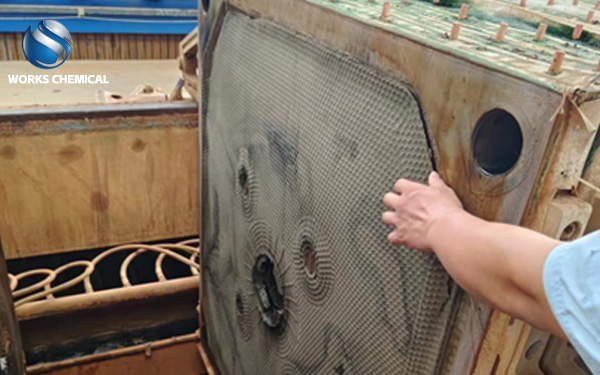
With the improvement of the final disposal requirements of sludge, in order to improve the dehydration efficiency of the plate and frame machine, it is often necessary to use chemicals to tempering and treating the sludge, and the polymer flocculant will cause the blockage of the filter cloth and affect the operation of the equipment, so it can not be used. The addition of inorganic salt (such as iron salt, calcium salt, etc.) regulator can separate the cement, but due to the large amount of addition, the amount of dry mud will be greatly increased, resulting in a decrease in the combustion value of dry mud, and the cost of sludge subsequent disposal will also increase. Weifang Wokos Chemical Co., LTD introduced a self-developed and innovative, high-performance organic sludge dewatering agent (plate and frame desliming adjuster) for plate and frame mud press, which can be applied to the sludge dewatering treatment of plate and frame mud press. The dewatering effect is good, and the moisture content of dry mud after treatment can reach below 60%, and it will not pollute and block the filter cloth, and will not affect the normal operation of the mud press.

Works Chemical- Sludge conditioner, sludge dewatering synergist manufacturer
Plate frame desliming conditioner features:
1. Organic high-efficiency sludge dehydrant replaces inorganic salt products to reduce sludge increment;
2. Plate frame desliming conditioner does not use acid inorganic salt to avoid equipment corrosion, reduce filter cloth fouling, extend service life;
3. No FeCl3 products are used, and no excess Cl ions will remain in the filtrate and sludge to avoid the impact on the biochemical system in the subsequent treatment of the filtrate;
4. The board frame desliming conditioner uses organic high-efficiency sludge dehydrating agent to increase the calorific value of sludge, which is conducive to incineration;
5. The board and frame desliming conditioner uses organic high-efficiency sludge dehydrating agent to increase the proportion of organic matter in sludge, which is conducive to subsequent garden greening projects such as composting.